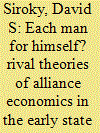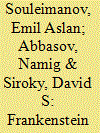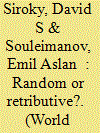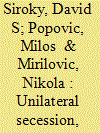|
|
|
Sort Order |
|
|
|
Items / Page
|
|
|
|
|
|
|
| Srl | Item |
| 1 |
ID:
192017


|
|
|
|
|
| Summary/Abstract |
As an embedded sociocultural code, blood revenge is present in many societies where civil wars occur. Whereas evidence from other social sciences attests to its enduring global significance, security studies scholarship has largely neglected the custom of blood revenge. This article is the first to investigate its relevance for understanding the inception, dynamics, and aftermath of armed conflicts, and to present a comprehensive account of how blood revenge may shape civil wars. Drawing upon multidisciplinary scholarship, cross-case qualitative evidence, and a newly compiled dataset, this proof-of-concept article illustrates how blood revenge influences key dynamics in civil wars—specifically, the processes of violent mobilization, target selection, recruitment, defection, and disengagement. Setting the stage for further inquiries into the causes, mechanisms, and consequences of blood revenge in civil war, this conceptual article suggests why and how this sociocultural code continues to influence civil wars across the world.
|
|
|
|
|
|
|
|
|
|
|
|
|
|
|
|
| 2 |
ID:
113327


|
|
|
|
|
| Publication |
2012.
|
| Summary/Abstract |
When military alliances are expensive, they naturally raise distributional issues. This article considers two theories to explain how much a state will voluntarily contribute to the economic burdens of defense. Empirical work has relied largely on data from the twentieth century. This article provides an out-of-sample test to evaluate the models. Using data on the Quintuple Alliance, the results are more consistent with the predictions of the joint products model than the pure public goods model. Due to credible commitment problems, and intra-alliance cleavages, I argue that we should not expect substantial free riding in most conventional military alliances.
|
|
|
|
|
|
|
|
|
|
|
|
|
|
|
|
| 3 |
ID:
163166


|
|
|
|
|
| Summary/Abstract |
Many scholars have suggested that organized violence in Chechnya has ended, and that Russia’s Chechenization policy and Ramzan Kadyrov’s presidency deserve the credit. We suggest that Putin has created a Frankenstein-like ruler over whom he risks losing control. As a result, the conflict only appears resolved, and we draw attention to both vertical and horizontal cracks in the foundation of Kadyrov’s rule that could lead to renewed violence. Vertically, the Chechen strongman and his growing clout in regional and federal politics have antagonized Russian siloviki. Horizontally, thousands of Chechens appear to be in a state of postponed blood feud toward Kadyrov, his clan, and the kadyrovtsy, his personal army. Backed by President Putin’s personal support, Kadyrov has put in motion a brutal machine of persecution over which some signs indicate he has lost control. Fear of extermination at the hands of the Kadyrov and his personal army has kept most prospective avengers at a bay. Once President Putin’s support wanes, locals will retaliate against Kadyrov and against Russian troops stationed in the republic, and Russian law enforcement circles will openly challenge Kadyrov’s rule. Putin’s support is only likely to wither if the costs of continued support (which grow with Kadyrov’s increasing independence) exceed the benefits (derived from an enforced peace). Either a renewed insurgency or ever more recalcitrant behavior would demonstrate a level of interest misalignment that could induce Putin to withdraw his support. Such a turn of events would render these horizontal and vertical cracks in the foundation of Kadyrov’s rule more noticeable and would likely to cause the frozen conflict in Chechnya to thaw, leading to a new civil war.
|
|
|
|
|
|
|
|
|
|
|
|
|
|
|
|
| 4 |
ID:
186040


|
|
|
|
|
| Summary/Abstract |
Drawing on original interviews with ex-insurgents and eyewitnesses of the Second Chechen War (1999–2009), this article develops a theory of “kin killing,” defined as the use of lethal violence against insurgents’ relatives as a deliberate counterinsurgency tactic. Family-based targeting works by coercing insurgents to surrender or defect, deterring insurgents’ relatives from retaliation, and discouraging prospective recruits from joining or supporting insurgents. Because it targets a small number of individuals who have strong ties to insurgents, kin killing is the most selective form of collective violence. The tactic is most likely to be used by illiberal regimes that know the identity of the insurgents, but not their location, and operate in traditional societies with large, tightly knit families. Most would consider kin killing—and its nonlethal counterpart, kin targeting—ethically reprehensible, but numerous countries have employed it with varying degrees of success, including Russia, the United Kingdom, and China. Militarily dominant regimes who employ kin killing can turn family members from force multipliers into pressure points for insurgents, as regimes “flip the network” and make restraint, rather than revenge, the best way to protect one’s family.
|
|
|
|
|
|
|
|
|
|
|
|
|
|
|
|
| 5 |
ID:
149519


|
|
|
|
|
| Summary/Abstract |
This article provides a critical examination of the current theoretical debate concerning the effects of indiscriminate violence. It argues that indiscriminate violence has been treated as an essentially random counterinsurgency tactic, but that the important distinction between its random and retributive variations has been overlooked, along with critical issues of timing and location, which has made it difficult to evaluate its efficacy in quelling rebel violence. Prior research has shown that both random and retributive violence reduced insurgent activity in the targeted locations and in the short term, but it does not necessarily follow that indiscriminate violence is effective. This article uses microlevel ethnographic evidence from Chechen villages during the period from 2001 to 2005 to show that indiscriminate violence deployed retributively against village communities generated insurgent activity in other areas because local avengers and rebels from the targeted populations sought to avoid further retributive violence against their village communities. Moreover, the insurgent activity occurred at least nine months after the initial act of retributive violence. Indiscriminate violence deployed randomly against village communities generated insurgent activity within the same targeted area, since the insurgents did not fear retributive violence in retaliation, and occurred with a delay of at least six months. As a result, the rebel reaction to indiscriminate violence is not observed immediately or, in the case of retributive violence, in the same location. This finding has crucial implications for evaluating the efficacy of indiscriminate violence in counterinsurgency operations, and underscores the importance of understanding how the social and political context can shape the way populations react to different forms of violence.
|
|
|
|
|
|
|
|
|
|
|
|
|
|
|
|
| 6 |
ID:
182671


|
|
|
|
|
| Summary/Abstract |
Recognition of aspiring states from established countries is central to becoming a member state of the international system. Previous research suggests that great power recognition decisions regarding aspiring states rapidly converge toward either recognition or non-recognition, yet great power convergence has still not occurred in the case of Kosovo after more than ten years. Unilateral secessions typically remain wholly unrecognized, since they violate the norm of home state consent, yet Kosovo has now been recognized by more than 100 countries. Why do some countries extend recognition to unilateral secessions, and do so early, whereas others delay recognition or withhold it altogether? In the case of Kosovo, great power influence and contestation, rather than convergence, have played a key role in shaping recognition decisions. We argue that countries in the US sphere of influence, with strong economic and military ties, are more likely to recognize Kosovo and to do so relatively fast, whereas countries influenced by Russia are less likely to recognize Kosovo at all, or to do so only after an extended delay. However, great powers are not equal in influencing other states to adopt their preferred position, since the USA is more powerful than Russia and can benefit from working alongside allies within the Western-oriented world order. We estimate a non-proportional Cox model with new time-varying data on Kosovo recognition and provide evidence that US military ties influenced other countries in extending recognition to unilateral secession.
|
|
|
|
|
|
|
|
|
|
|
|
|
|
|
|
| 7 |
ID:
153554


|
|
|
|
|
| Summary/Abstract |
While the efforts of great powers to export their regimes to small states is well studied in the literature, the role of mass opinion in small states where great powers compete for influence remains under-theorized as a factor that can shape small state preferences over foreign alliances and policies. This paper investigates the causes of individual-level variation in foreign policy preferences toward major powers in small states with big neighbors. Using recent public opinion data from Georgia, we propose a conceptual framework based on three factors—political paternalism, economic status, and religiosity—to explain why some individuals in small states prefer closer ties with different major powers. We find support for all three factors influencing foreign policy attitudes toward Russia, but not America. As great powers continue to pursue policies that encourage their preferred political orders in small states, the analysis of foreign policy preferences in such states will become increasingly vital to our understanding of world politics.
|
|
|
|
|
|
|
|
|
|
|
|
|
|
|
|
|
|
|
|
|